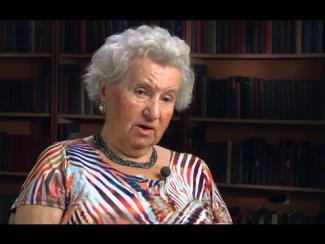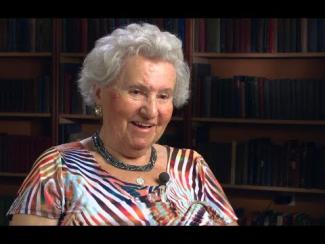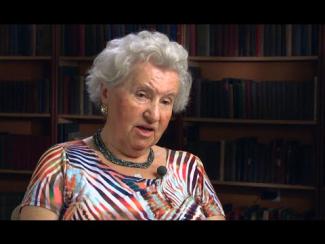The Yiddish Book Center's
Wexler Oral History Project
A growing collection of in-depth interviews with people of all ages and backgrounds, whose stories about the legacy and changing nature of Yiddish language and culture offer a rich and complex chronicle of Jewish identity.
Esther Feder Lesell's Oral History
Esther Feder Lesell, Holocaust survivor who immigrated to the USA in 1950, was interviewed by Jessica Parker on August 26, 2014 at the Yiddish Book Center in Amherst, Massachusetts. Esther was born in Poland to a Yiddish-speaking family. She says the war began for her family in 1932 when her grandfather was killed in a pogrom. During the war, her family took a train to a displaced persons camp in Kiev, where her brother and father were taken to the army. In 1948, her mother immigrated to Israel, and Esther left for America. With little English, she and her husband settled in Newark, New Jersey. Although she found a community in an Orthodox synagogue, it was difficult to trust others. Esther describes her life in Poland as terrible. She doesn't remember any education but suspects she attended Hebrew school. Esther recalls hiding in a closet and spending time in an orphanage while in Russia. Her family was religious in Poland but were not after the war. Although they kept kosher and admired people who were religious, they did not trust them or take any charity. YIVO provided transport to a German DP camp, which Esther describes as much better than the Russian one. There her friends kept an eye on one another. She says there was very little cultural life in the camp but recalls many services for the sick. Esther describes getting married in the camp at eighteen years old. When Esther's father passed, she went to the funeral in Israel; she did not feel anything, describing him as a stranger. He had a family in Russia and lived a comfortable life. She says life would have been easier to have his love. She doesn't forgive him but credits him with helping the family escape from Lvov. In the United States, Esther felt free and proud of her survival. She wanted her children to be born in America to have the opportunity of receiving an education and having a happy life. She worked part-time because she did not want a babysitter. Esther and her husband bought their first home in Lakewood, New Jersey, close to retirement. She maintains Orthodox traditions while trying to fit in. It brings her happiness that her children practice Judaism and have a Yiddish and Hebrew education. Esther gave her grandchildren scarves as a sign of acceptance, something she did not feel from her father. She is proud to identify as a yidish tokher, Jewish daughter, and advises future generations to keep with Jewish traditions.
This interview was conducted in English.
Esther Feder Lesell was born in Europe (Russia, Poland, or Germany) in 1930.





